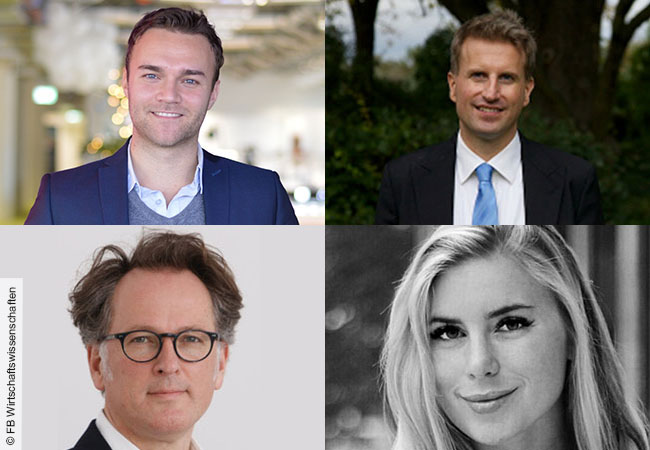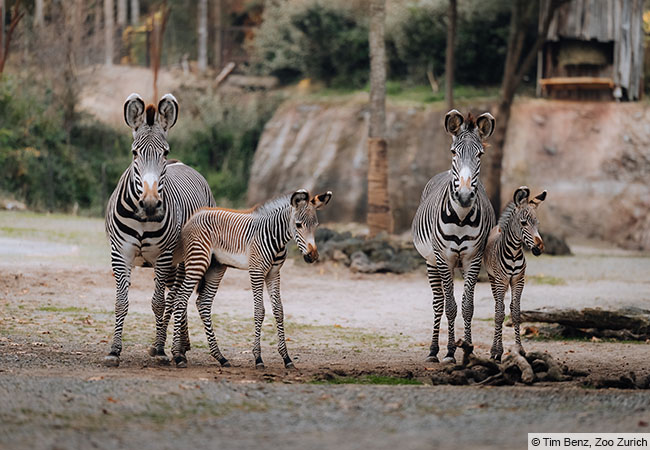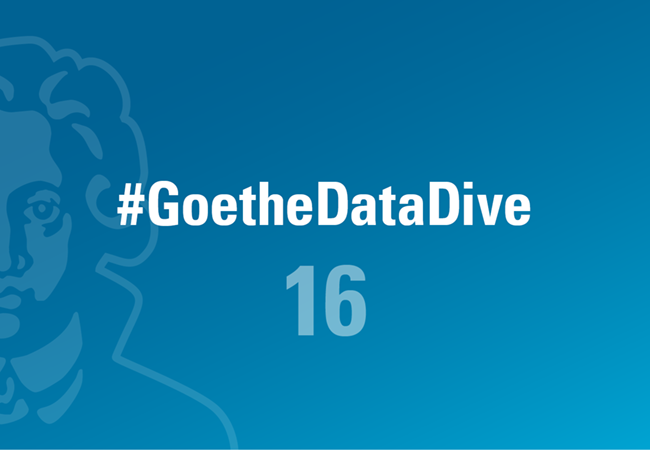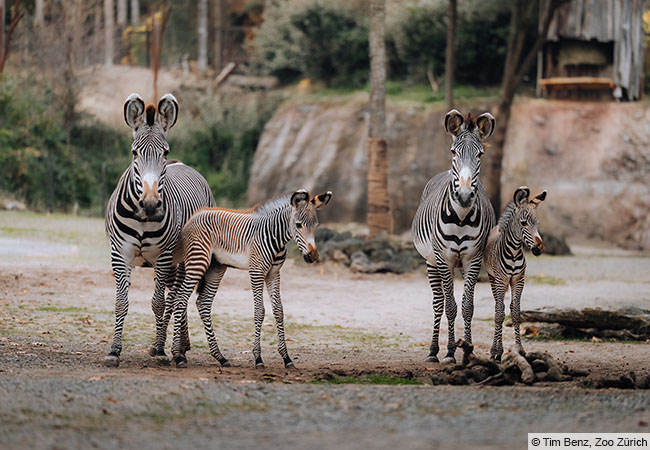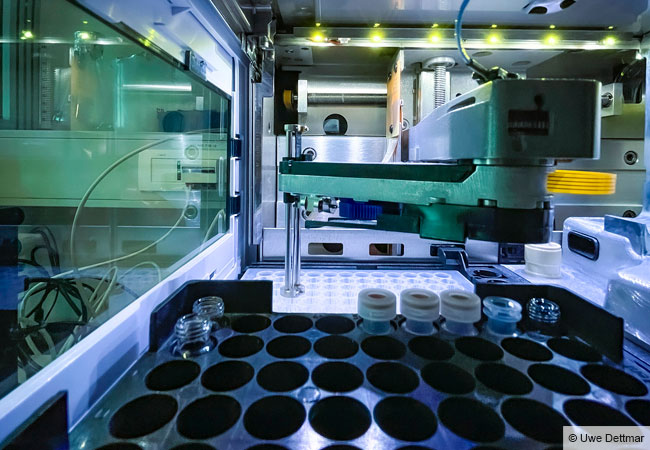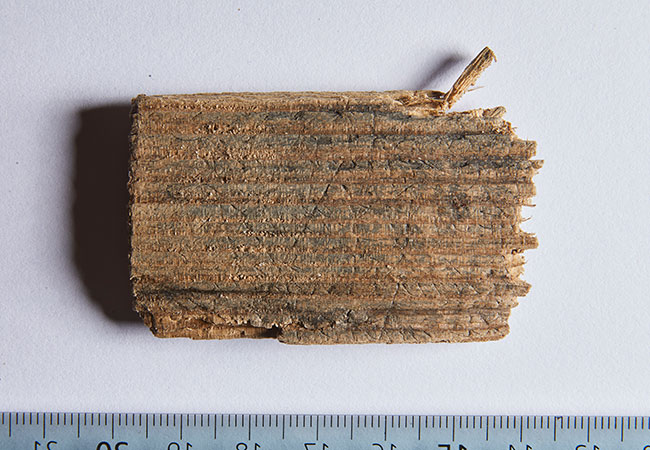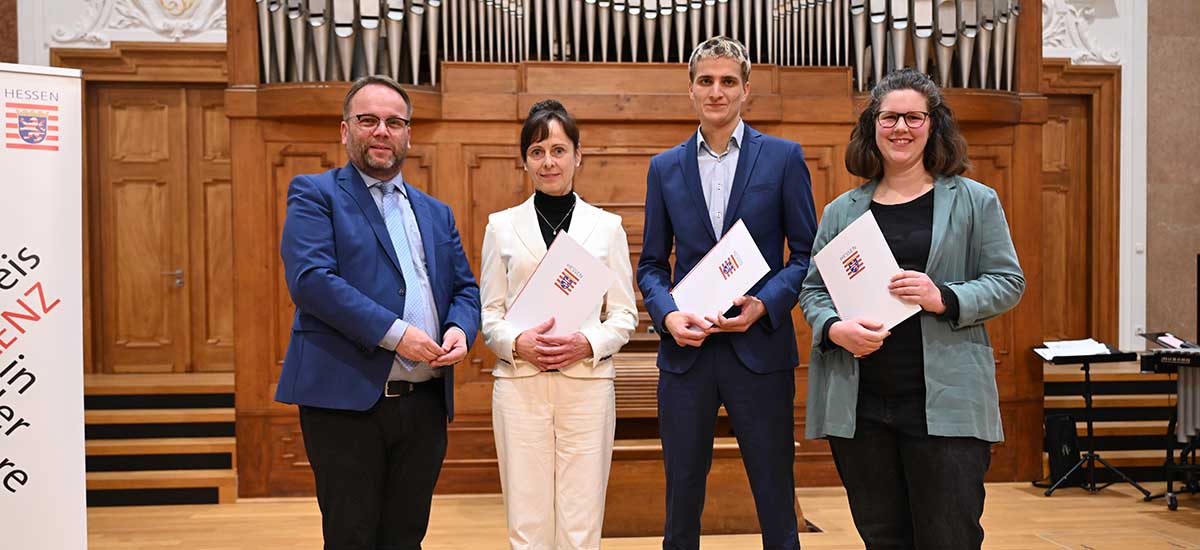
Two Goethe University pilot projects scooped up awards at this year’s Hessian University Prize for Excellence in Teaching [Hessischer Hochschulpreis für Exzellenz in der Lehre]. Second prize in the category “Project prize for a working group/organizational unit” and with it a prize money of €30,000 went to Call-a-CAB, while MakeLab received the €10,000 award in the category “Student initiative”. Hessian Science Minister Timon Gremmels presented the Hessian University Prize for Excellence in Teaching 2024 at a ceremony held in the historic Jügelhaus building of the Senckenberg Society for Nature Research on November 28, 2024. In his speech, the minister highlighted the way the prizewinners combined fundamental theoretical aspects with practical tasks while simultaneously keeping their eyes on students’ individual circumstances and learning success. That is what good teaching is all about, he added.
The service-learning seminar Call-a-CAB – the brainchild of Prof. Sabine Windmann, Lucie Binder, Bettina Schultz and Henri Krake – enables psychology students to apply their knowledge in everyday settings and acquire practical skills. CAB stands for “Come-along-Buddy”, and perfectly describes the concept: Seminar participants support students of any subject with tackling challenges that come up during their courses. According to the jury, the well-executed seminar not only has a lasting positive effect on students’ successful learning, it can also be easily applied at other universities, too. Beyond that, the learning concept, which undergoes permanent further development, manages to integrate the required practical, directly applicable training skills into the psychology degree course, the jury said, adding that in addition to assuming responsibility, participants also practice basic psychological and advisory skills that will be relevant later in their professional work.
The interdisciplinary student initiative MakeLab runs an open workshop as a “makerspace” and 3-D lab at Goethe University. It was set up by Patrick Gunkel, Maite Vera von Bargen, Tarick Horky, Paula Kilp, Kyle Rinfreschi, Theresa Berg, Corinna Kraft, Jou Preuss, Silvan Kuhlke, Sandra Stelzenmüller and Johannes Göpel. MakeLab is designed to be a space for students to teach, learn and experiment, while simultaneously providing access to devices and tools, along with aids to help people help themselves, execute successful knowledge transfer, and provide advice and support for projects. The jury stressed the outstanding student initiative’s particularly strong culture of experimentation, the interdisciplinary, cooperative work between participants from different subjects, and the wide variety of projects realized. It was also impressed by the student volunteers’ huge commitment and their integrative activities at the university.
Prof. Viera Pirker, Goethe University’s Vice President Teaching and Studies, said, “This year, the jury of the Hessian University Prize for Excellence in Teaching decided to honor Goethe University’s projects Call-a-CAB and MakeLab – a decision that pays tribute both to a cooperative teaching-and-learning model and to an active learning project. Both projects emphasize interaction and cooperation, as well as constructive dialog between learners and teachers and between the students themselves. In that sense, they have brought to life an important principle of our Mission Statement Study and Teaching, i.e. that social interaction promotes academic knowledge and knowledge expansion. On behalf of the university, I sincerely congratulate the winning projects.”
The Career Service, Scholarships and Awards office of Goethe University’s Global Affairs Study Teaching department both coordinates the internal procedure and supports the tendering process, organization and selection of submissions to the Hessian Ministry of Science and Research, Arts and Culture (HMWK). Patronage over the selection and application process rests with Goethe University’s Vice President Teaching and Studies, and the internal selection jury is formed from the QSL Study Commission. The five selected entries and their authors are optimized before their submission to the HMWK. In addition, the department also supports applicants during the jury’s visits. In 2024, a total of 16 projects were submitted for internal preselection. The invitation to tender for 2025 was launched on November 25.
Further information about the entry procedure is available on Goethe University’s website: https://tinygu.de/bM7pe
Further information and films (also about the two prizewinning projects from Frankfurt) can be found at www.hochschullehrpreis.hessen.de


